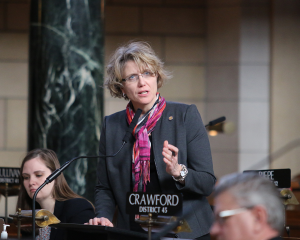Session Review: Urban Affairs
Economic development, zoning ordinances and city financing were among the Urban Affairs topics taken up by lawmakers this session.

A bill passed that will require businesses to disclose additional information before applying for certain local economic development programs.
The provisions of LB1059, introduced by Bellevue Sen. Sue Crawford, apply to businesses seeking economic development incentives under the Local Municipal Economic Development Act or entering into a redevelopment contract using tax increment financing (TIF).
Before applying for local incentives, a business must certify:
• whether it has filed or intends to file an application to receive tax incentives under the Nebraska Advantage Act for the same project;
• whether such application includes or will include a refund of the municipality’s local option sales tax revenue; and
• whether such application has been approved.
The bill was amended to include provisions of two related bills.
LB860, originally introduced by Venango Sen. Dan Hughes, authorizes a municipality to use funds from a Local Municipal Economic Development plan for workforce housing. Currently funds from such plans may be used only for low- and moderate-income housing.
Originally introduced by Lincoln Sen. Matt Hansen, LB808 allows a municipality to amend an existing Local Municipal Economic Development plan to add or remove a qualifying business if its citizen advisory review committee recommends the addition or removal. The provisions require a public hearing and a supermajority vote—two-thirds of members—by the municipality’s governing body.
The bill passed on a 44-1 vote.
LB1012, introduced by Omaha Sen. Heath Mello, allows municipalities to create clean energy assessment districts. Property owners within such districts are eligible to apply for financing through the municipality to make energy efficiency and renewable energy improvements on residential, commercial and industrial properties.
Passed on a 45-0 vote, the bill authorizes a municipality to issue revenue bonds to finance qualifying projects, which can be paid back only through assessments levied on the property owners. Any single bond issued by a municipality that exceeds $5 million will require voter approval.
LB699, also introduced by Mello, updates the Nebraska Municipal Land Bank Act.
Currently, the voting members of a land bank board must represent realtors, the banking industry, real estate developers, a chamber of commerce, a nonprofit involved in affordable housing and an owner of multiple residential or commercial properties.
Approved on a 46-0 vote, LB699 stipulates that a single voting member may satisfy more than one of the representational requirements if he or she has the required qualifications.
Lawmakers passed a bill that changes voter approval requirements for a first-class city to borrow funds for parks and recreation public improvements.
LB378, sponsored by North Platte Sen. Mike Groene, requires that the specific type of security pledged to secure financing be noted on the initial ballot. In addition, any refinance proposal to change the type of security from revenue bonds to general obligation bonds must be subject to a vote of the people.
The bill passed 47-0.
Restrictions on asset expenditures by sanitary and improvement districts (SIDs) that have received notice of annexation were approved this session.
Under LB131, introduced by Omaha Sen. Joni Craighead and approved 46-0, expenditures by an SID will be restricted for 90 days upon receiving notification of a city or village’s intent to annex.
Payments on construction bonds, construction fund warrants, general fund warrants and contracted labor and services are exempt from the spending restriction.
The bill includes provisions of LB827, sponsored by Omaha Sen. Burke Harr and originally heard by the Government, Military and Veterans Affairs Committee, which makes clear that counties may collect ad valorem taxes and special assessments from SIDs.
LB295, sponsored by Norfolk Sen. Jim Scheer, requires some municipalities to provide notification to a county board before changing zoning ordinances within their extraterritorial zoning jurisdiction (ETJ).
The bill requires a first- or second-class city or village to provide the county board of a county in which the municipalities’ ETJ is located with written notice of—and the opportunity to comment on—proposed zoning ordinance changes within the ETJ.
The bill does not apply to cities or villages located in a county with a population greater than 100,000 or counties in which the city and county have a joint planning commission or joint planning department.
The bill passed on a 46-0 vote.
Procedures for approval of planned unit developments in some second-class cities and villages will change under LB875, introduced by Gretna Sen. John Murante.
Currently, a county that has adopted a comprehensive development plan and is enforcing subdivision regulations must approve a planned unit development in a second-class city or village’s ETJ.
LB875 removes the requirement that the county must approve the plan in a county with a population between 100,000 and 200,000. Sarpy is the only county impacted by the bill.
A second-class city or village still will be required to submit a planned unit development to the county planning and public works departments for review.
The bill passed 47-0.
LB806, introduced by Mello, would have authorized a metropolitan, primary, first- or second-class city to create a riverfront development district and appoint an authority to oversee and manage the district.
The bill was advanced to general file on a 6-0 vote but was not scheduled for debate.

